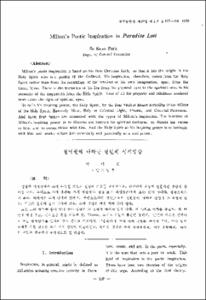국어의 부정의문문과 화행
- Alternative Title
- Negative Questions and Speech Acts in Korean
- Abstract
- 이 논문은 아래와 같은 문형과 화행의 관계를 밝히기 위해서 쓴 것이다.
(1) 영희는 같지 않니 ?
이 문형의 특징은 일반적인 장형 부정문과는 달리 시제 표지가 '지'앞에 실현되고 있다는 점이다. 우리는 장경기(1986) 에서 이 문형을 동사적으로는 부정의문문이며, 화자의 전제라는 관점에서는 전용적 이차전제용법이라고 분석한 바 있다.
비 문자적 간접화행(nonliteral indirect speech act)은 문자적인 직접화행(literal direct speech act)을 통해서 간접적으로 수행되는 언어 행위이다. (1)의 직접화행은 다른 일반 의문문과 마찬가지로 '질문'이다. 그러나 (1)의 간접화행은 '진술' '감탄'등 적절한 상황에서는 여러가지 다양한 화행을 갖는다. 이 점은 비전제용법 및 일차전제용법의 부정의문문의 간접화행이 극히 제한적인 점과 비교할 때 이차전제용법의 부정의문이 갖는 주목할 만한 화용론적 특징이다. 이는 또한 국어의 화행론적 특성을 증명하는 의미있는 증거가 될 것이다.
This paper aims to describe the relationship between negativw questions and speech acts in Korean.
Our preceding paper(1986) has argued that Korean negative questions as will as English negative questions have unpresuppositional usages, primmary presuppositional usages, and secondary oresuppositional usages, which are categorized on the basis of speaker's presuppositions. Unlike the other ones, the secondary presuppositional usage is a marked case in that it aske for the hearer's confirmation about the speaker's affirmative presupposition through the syntactic negative question.
We suppose that this pragmatic nature is deeply related to the potentiality of speech acts of negative questions. The nonliteral indirect speech act is an act performed indirectly by way of performing the literal direct speech act. Our argument is that, unlike the other ones, the negative question with the secondary presuppositional usage is much more pragmatic and therefore has relatively varied types of indirect speech acts such as statement, exclamation, ect, depending on the appropriate circumstances. Last but not least, this is seemingly not language-specific but language-universal.
This paper aims to describe the relationship between negativw questions and speech acts in Korean.
Our preceding paper(1986) has argued that Korean negative questions as will as English negative questions have unpresuppositional usages, primmary presuppositional usages, and secondary oresuppositional usages, which are categorized on the basis of speaker's presuppositions. Unlike the other ones, the secondary presuppositional usage is a marked case in that it aske for the hearer's confirmation about the speaker's affirmative presupposition through the syntactic negative question.
We suppose that this pragmatic nature is deeply related to the potentiality of speech acts of negative questions. The nonliteral indirect speech act is an act performed indirectly by way of performing the literal direct speech act. Our argument is that, unlike the other ones, the negative question with the secondary presuppositional usage is much more pragmatic and therefore has relatively varied types of indirect speech acts such as statement, exclamation, ect, depending on the appropriate circumstances. Last but not least, this is seemingly not language-specific but language-universal.
- Issued Date
- 1989
- Type
- Research Laboratory
- Alternative Author(s)
- Chang,Kyung-key
- Publisher
- 연구논문집
- Language
- kor
- Rights
- 울산대학교 저작물은 저작권에 의해 보호받습니다.
- Citation Volume
- 20
- Citation Number
- 1
- Citation Start Page
- 49
- Citation End Page
- 63
- Appears in Collections:
- Research Laboratory > University of Ulsan Report
- 파일 목록
-
-
Download
 000002025435.pdf
기타 데이터 / 366.38 kB / Adobe PDF
000002025435.pdf
기타 데이터 / 366.38 kB / Adobe PDF
-
Items in Repository are protected by copyright, with all rights reserved, unless otherwise indicated.